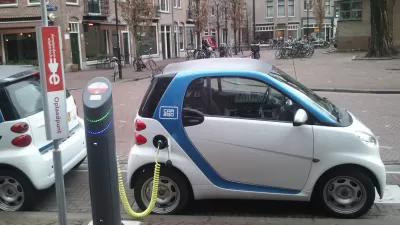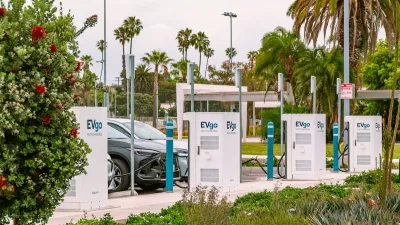The Netherlands is proceeding with one of the most ambitious programs to increase electric car usage in the world. In a country with seemingly ideal conditions for adoption, and heavy subsidy, sales of such vehicles have been disappointingly low.

"Although a number of European countries and a few American states are aggressively promoting the use of electric vehicles to reduce planet-warming emissions and pollution, the Netherlands provides perhaps the ultimate feasibility test," reports Elisabeth Rosenthal. "If electric vehicles catch on anywhere, it should be here: a small country — about 100 miles east to west — with gas prices of about $8.50 a gallon and a long tradition of environmental activism."
"To encourage electric driving, the country is developing a rapidly expanding national grid of charging stations in cities and along highways; and Amsterdam offers owners of electric vehicles free street parking and charging. With hefty tax breaks, promotional leases and cheaper operating costs, the vehicles offer driving costs no more than those of conventional cars, some analysts say."
"And yet, experiments with the cars in the Netherlands and Denmark also underscore the challenges facing this new technology. Sales have been lower than politicians and automakers hoped, representing under 1 percent of new vehicles, even here. 'It seems that the industry has not convinced consumers that they can do this,' [Peder Jensen, a transportation expert at the European Environment Agency said]. 'If they fail over the next few years, I think investors will pull out, and that will be a problem.'”
FULL STORY: Plugging In, Dutch Put Electric Cars to the Test

Alabama: Trump Terminates Settlements for Black Communities Harmed By Raw Sewage
Trump deemed the landmark civil rights agreement “illegal DEI and environmental justice policy.”

Planetizen Federal Action Tracker
A weekly monitor of how Trump’s orders and actions are impacting planners and planning in America.

The 120 Year Old Tiny Home Villages That Sheltered San Francisco’s Earthquake Refugees
More than a century ago, San Francisco mobilized to house thousands of residents displaced by the 1906 earthquake. Could their strategy offer a model for the present?

In Both Crashes and Crime, Public Transportation is Far Safer than Driving
Contrary to popular assumptions, public transportation has far lower crash and crime rates than automobile travel. For safer communities, improve and encourage transit travel.

Report: Zoning Reforms Should Complement Nashville’s Ambitious Transit Plan
Without reform, restrictive zoning codes will limit the impact of the city’s planned transit expansion and could exclude some of the residents who depend on transit the most.

Judge Orders Release of Frozen IRA, IIJA Funding
The decision is a victory for environmental groups who charged that freezing funds for critical infrastructure and disaster response programs caused “real and irreparable harm” to communities.
Urban Design for Planners 1: Software Tools
This six-course series explores essential urban design concepts using open source software and equips planners with the tools they need to participate fully in the urban design process.
Planning for Universal Design
Learn the tools for implementing Universal Design in planning regulations.
Clanton & Associates, Inc.
Jessamine County Fiscal Court
Institute for Housing and Urban Development Studies (IHS)
City of Grandview
Harvard GSD Executive Education
Toledo-Lucas County Plan Commissions
Salt Lake City
NYU Wagner Graduate School of Public Service





























